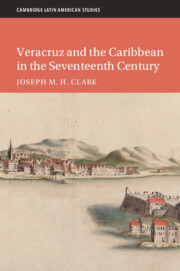
-
Select format
-
- Publisher:
- Cambridge University Press
- Publication date:
- 19 January 2023
- 19 January 2023
- ISBN:
- 9781009180337
- 9781009180313
- 9781009180320
- Dimensions:
- (229 x 152 mm)
- Weight & Pages:
- 0.66kg, 340 Pages
- Dimensions:
- (229 x 152 mm)
- Weight & Pages:
- 0.552kg, 340 Pages
You may already have access via personal or institutional login
Book description
In the seventeenth century, Veracruz was the busiest port in the wealthiest colony in the Americas. People and goods from five continents converged in the city, inserting it firmly into the early modern world's largest global networks. Nevertheless, Veracruz never attained the fame or status of other Atlantic ports. Veracruz and the Caribbean in the Seventeenth Century is the first English-language, book-length study of early modern Veracruz. Weaving elements of environmental, social, and cultural history, it examines both Veracruz's internal dynamics and its external relationships. Chief among Veracruz's relationships were its close ties within the Caribbean. Emphasizing relationships of small-scale trade and migration between Veracruz and Caribbean cities like Havana, Santo Domingo, and Cartagena, Veracruz and the Caribbean shows how the city's residents – especially its large African and Afro-descended communities – were able to form communities and define identities separate from those available in the Mexican mainland.
Awards
Honorable mention, 2024 Bandelier/Lavrin Book Prize, Rocky Mountain Council for Latin American Studies
Reviews
‘In this deeply researched and original book, Joe Clark argues for a distinct Mexican-Caribbean urban history. Africans and their descendants formed the majority population of seventeenth century Veracruz; Clark sheds light on their social, cultural, and economic roles in Veracruz and the circum-Caribbean networks of Havana and Cartagena. An important contribution to Mexican, Caribbean, and Atlantic World histories.’
Jane Landers - author of Atlantic Creoles in the Age of Revolutions
‘This richly documented history of Veracruz gives new meaning to the bound waters of the Gulf of Mexico and the Caribbean Sea. Joe Clark demonstrates the utility of seeing beyond the lines drawn on imperial maps to understand the web of relations that connected Afro-diasporic communities. It is an exceptional achievement.’
Tatiana Seijas - author of Asian Slaves in Colonial Mexico: From Chinos to Indians
‘This excellent, long-awaited study breaks new ground by examining seventeenth-century Mexico in relation to the Spanish Caribbean. Creatively employing an impressive range of disparate sources, Clark opens multiple new ways of envisioning early colonial Veracruz as a Black and Caribbean space.’
David Wheat - author of Atlantic Africa and the Spanish Caribbean, 1570–1640
‘…Clark has produced a dynamic history of seventeenth-century Veracruz. Crucially, by moving beyond the geographic framings privileged by elites, he demonstrates the importance of regional, granular perspectives for uncovering the experiences of individuals, especially those of African descent, within a multifaceted Caribbean world.’
Casey Schmitt Source: Hispanic American Historical Review
‘… a very welcome contribution to Latin American historiography.’
Ramona Negrón Source: International Journal of Maritime History
‘Clark’s monograph makes a meaningful contribution to the historiographies of New Spain, as well as the Caribbean. His conclusion centers on a map that characterizes the Caribbean as the Mexican archipelago, forcing scholars to think about geography and the ways persistent classifications can - and should - be challenged.’
Keith Richards Source: The Latin Americanist
‘This book … forges an original, strategically documented approach to a node connecting Caribbean commercial circuits to the Viceroyalty of New Spain (Mexico). Intelligently and creatively drawing upon archival documentation from diverse repositories, [it] exemplifies the cis-Atlantic approach to history. It engages and enriches recent scholarship, with especially significant attention to the meanings and persistence of ethnic identifications.’
Bethany Aram Source: American Historical Review
Contents
Metrics
Altmetric attention score
Full text views
Full text views help Loading metrics...
Loading metrics...
* Views captured on Cambridge Core between #date#. This data will be updated every 24 hours.
Usage data cannot currently be displayed.
Accessibility standard: Unknown
Why this information is here
This section outlines the accessibility features of this content - including support for screen readers, full keyboard navigation and high-contrast display options. This may not be relevant for you.
Accessibility Information
Accessibility compliance for the PDF of this book is currently unknown and may be updated in the future.

